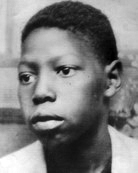Johnny Robinson
- This article is about the teenager killed in 1963. For the Ramblers' drummer, see Johnny Robinson (drummer).
Johnny Brown Robinson (sometimes called James Robinson or Johnnie Ray Robinson) (born c. 1947; died September 15, 1963 in Birmingham) was a teenaged victim of a police shooting during the violent aftermath of the bombing of 16th Street Baptist Church in September 1963.
Robinson was the son of Johnny Brown and Martha Marie Robinson. He lived with his widowed mother and two siblings at 622 28th Street North and attended Alberta Shields School in North Avondale. His younger siblings had gone to live with an aunt after his father's death in a fight a few years earlier. In 1960 Johnny was arrested on suspicion of burglary and grand larceny, and served some time in juvenile detention. As a sixteen-year-old in 1963, Johnny was with a group of friends caught in the chaos which followed the church bombing.
Tensions mounted in the aftermath of the Sunday-morning tragedy. According to multiple reports, white males were cruising the downtown area in cars, waving Confederate flags, yelling racial slurs and throwing soda bottles at blacks. One car was painted with slogans such as "Negro, Go Back to Africa," and another was draped with a battle flag.
Robinson, Doug McCall, Lorenza McCall, and two other boys were hanging out at a gas station at 26th Street and 8th Avenue North. They exchanged words with some white youth in a car. According to newspaper accounts, at about 4:00, Birmingham Police responded to a report of "Negroes throwing rocks at whites".
When police arrived, the boys fled from the scene. Robinson and the McCalls ran down an alley. One police car encountered the trio in the alley between 8th and 9th Avenue North near 26th Street. Officer P. C. Cheek, who was driving, positioned the car to block the alley while officer Jack Parker, riding in the back seat, pointed his police-issue shotgun, loaded with buckshot, out the window. At this point accounts vary.
McCall, speaking to an interviewer 50 years later, recalled that he ducked into the back door of a two-story motel, where he heard several shotgun blasts. According to Parker's own account, as the car blocked the alley, he yelled for the boys to halt and fired a warning shot into the ground to disperse the "crowd", accidentally striking Robinson. Cheek and the two other officers riding with him, J. E. Chadwick and W. D. Haynie, told internal affairs investigators that they saw Robinson stumble and fall after hearing the shot, which may have been triggered accidentally as the car braked suddenly or hit a pothole.
Later police accounts argued that Parker had fired into the air, or fired in self-defense while the car was being pelted by rocks. Witnesses told FBI investigators that Parker took aim at the fleeing boys, and that there were two blasts fired without any verbal warnings. Six witnesses refused to testify in court, fearing police retribution. The McCall brothers were, in fact, intimidated by police afterward. They were picked up and driven to a vacant industrial site and stood up against a wall. The officers discussed "what to do" with the boys, then fired their weapons into the wall over their heads before freeing them.
Abraham Woods officiated at Robinson's funeral service at New Pilgrim Baptist Church. He attributed the tragedy to Birmingham's "long, despicable record of police brutality," and concluded that, "not only are we here for the funeral of Johnnie Robinson, but I think we can say we are here for the funeral of Birmingham."
Coroner J. O. Butler determined that Robinson was struck in the back with buckshot, causing him to die before he arrived at University Hospital. The shooting investigation was sent to a Jefferson County grand jury, but no indictment was made. A federal grand jury, given the case in 1964, also declined to indict.
Johnny's mother spent some time in a psychiatric hospital following the shooting. His siblings returned to school the next day and never learned the details of the case until after November 2009, when the Federal Bureau of Investigation reopened an investigation into Robinson's death. Agent Dana Gillis examined the case history and interviewed surviving family members. Gillis did conclude that Robinson was murdered. Because Parker died in 1977, however, no criminal charges were filed.
Robinson was inducted into the Birmingham Gallery of Distinguished Citizens in 2012.
References
- Beiman, Irving (September 16, 1963) "The day a church became a tomb" The Birmingham News - via Birmingham Public Library Digital Collections
- "Council asks for all facts on two deaths." (September 16, 1963) The Birmingham News
- "Police Brutality in Birmingham Charged: Negro Minister Speaks at Funeral" (September 23, 1963). Associated Press
- Gordon, Robert (September 25, 1963) "Birmingham pays homage to slain teen-age boys." Birmingham World
- Gordon, Robert K. (November 24, 2009) "FBI opens 3 civil rights cold cases." The Birmingham News
- Johnson Carrie (September 15, 2010) "Johnny's Death: The Untold Tragedy In Birmingham" Morning Edition. National Public Radio
- Paepcke, Jon (October 7, 2013) "13 Investigates: Breaking the silence" alabamas13.com - accessed October 8, 2013
